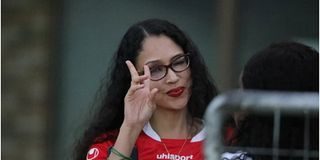Glaring wage gap just one aspect of gender inequality in sports

New Simba Sports Club Chief Executive Officer Barbara Gonzalez.
What you need to know:
- The little-known Taylor carries 18 years of corporate and commercial experience having worked as the Country Manager of Econet Media and in the Wholesale Business arm of the Botswana Telecommunications Corporation Limited, meaning she is amply qualified.
- More encouraging, she is unblemished by the toxic and divisive local football politics.
Women in sport were this week yet again reminded of the prejudices they still face.
NBA’s Golden State Warriors star forward Draymond Green claimed in a series of tweets that female athletes are putting too much focus on the pay discrepancy between their games and the men’s, and not putting enough effort into growing their game.
His reasoning was both apt and scrambled, so let’s press pause for now, because something more interesting happened during the week.
The Botswana Football Association named Goabaone Taylor as CEO, making her the first female ever to hold that position in that country. Not to go off tangent, one thing is becoming very apparent within sports leadership circles in our continent.
From AS Vita chairlady Bestine Kazadi in the Democratic Republic of Congo, who is the only female head of a top club in Africa, to Anisha Muhoozi of Uganda’s KCCA FC, to Barbara Gonzalez at Simba in Tanzania, it appears that the rarity of female leadership – leaving aside the morass of cultural and social factors that perpetuate alternative opinion – is a problem that can be readily addressed.
The little-known Taylor carries 18 years of corporate and commercial experience having worked as the Country Manager of Econet Media and in the Wholesale Business arm of the Botswana Telecommunications Corporation Limited, meaning she is amply qualified.
More encouraging, she is unblemished by the toxic and divisive local football politics.
An appointment like that may not dilute the need for better representation at all levels of the game, but it does help change perspectives.
Think of the “see it to be it” theory. When other women know they are realistic candidates for top jobs, and are considered as much by all stakeholders, it gives them an added layer of confidence.
Of course she won’t succeed alone in helping Botswana football turn over a new leaf, but her appointments is undeniably vital.
Now, back to Green. The NBA star may have misplaced the blame. Said he: “…I’m really tired of seeing them (women athletes) complain about the lack of pay because they’re doing themselves a disservice by just complaining...without laying out steps that they can take to change that. The people that can change it will just continue to say, ‘Well, the revenue isn’t there.’
“Call them out,” he said. “Make them react. (tell them,) you have not put a single penny toward the WNBA.
“You have not put a single penny toward these women athletes. But plastered all over your website is ‘women’s empowerment…’”
Fair enough. But do female footballers across the globe have the security to do that? US women’s team captain Megan Rapinoe aptly responded to Green.
“When we talk about equality in women’s sports, we always talk – first – about investment. And funding and resources and marketing and branding and investing in, not just the players, but the support staff and coaching.
“And media, TV media, print media – all of it. We understand that if all of those things are done, then yes, we will most likely be requiring a much higher salary than we’re at.”
I need not add more.





